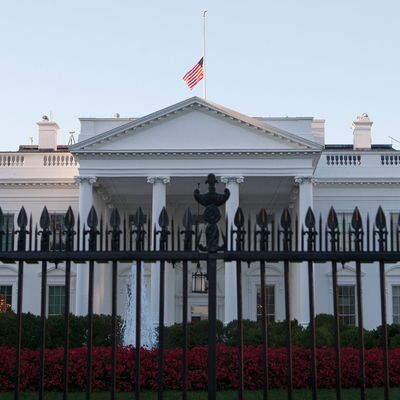
Last year, the Trump administration insisted that its regressive tax cuts were so important, it was worth adding $1.5 trillion to the national debt to ensure their passage. Now, the White House is warning Congress that the United States cannot afford to add $1.6 billion to the deficit to expand health-care options for veterans.
In a letter Monday, the Trump administration demanded that lawmakers fund a popular veterans’ health-care program — which allows former troops to spend public funds on private doctors and hospitals — with cuts to other parts of the budget. Democrats, and some top Senate Republicans, prefer to raise the current caps on discretionary spending instead.
The case for the latter option is straightforward. Congressional spending falls into two categories: mandatory (funding for programs like Social Security, which increases automatically as more Americans qualify for benefits) and discretionary (spending that Congress must actively renew). When Congress passed its omnibus budget bill back in March, the private veterans’ health-care program was on the mandatory side of the ledger. Thus, although lawmakers knew that federal spending on the program was going to increase, they didn’t have to account for its cost when setting a discretionary budget.
But last month, president Trump signed a law that reorganized veterans’ health care, and shifted funding for the private program into the discretionary column. This did not significantly increase the overall cost of domestic spending — but it did lift the price tag on the discretionary budget above previously set caps. Which is to say: It produced a budget shortfall that wasn’t a product of changes in fiscal reality, so much as in accounting practices.
Thus, Democrats and Senate Republicans like Alabama’s Richard Shelby have favored just lifting the caps. After all, lawmakers already need to resolve a host of other contentious budgetary issues between now and October, if they are to avoid a shutdown on midterms’ eve. Relitigating funding levels for various domestic programs — which Congress had found consensus on just months ago — is not a fight that most lawmakers want to have.
And it’s hard to see why the White House does. The administration’s desire to repent for its sins against fiscal responsibility is understandable enough (even if their gesture is roughly akin to a serial arsonist buying a single brownie from a local fire department’s bake sale). But why they would want to center their performance of deficit hawkery on the issue of veterans’ health care is baffling.
Yes, their official position is that the program must be funded with reductions in other appropriations. But the administration has already established that it believes corporate tax cuts are so important, they’re worth enacting at any fiscal cost. Given that context, it shouldn’t be difficult for Democrats to paint the White House’s current hard line on deficits as a tacit admission that it sees caring for America’s retired troops as less important than increasing corporate America’s allowance.






























